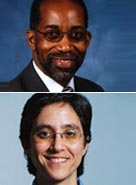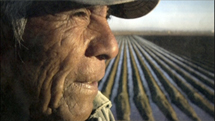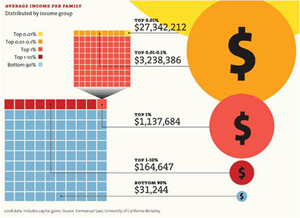NEWS
 Great news this month for Unnatural Causes advisors and ‘cast’ members David Williams and Nancy Krieger. Great news this month for Unnatural Causes advisors and ‘cast’ members David Williams and Nancy Krieger.
We’re delighted to learn that David Williams will receive the prestigious Leo G. Reeder Award for his many contributions to medical sociology from the American Sociological Association. Read the announcement describing David’s outstanding accomplishments.
Nancy Krieger has just published her brilliant and groundbreaking study of the history of competing epidemiological theories and why they matter, including her own ecosocial theory of disease distribution. The book is called Epidemiology and the People’s Health: Theory and Context (Oxford University Press). Click on the title for a 15% discount.
Congratulations, David and Nancy! Great work.
UNNATURAL CAUSES UPDATES
Electrolux Shutters last U.S. factories
“The Not Just a Paycheck” episode of Unnatural Causes traveled to Greenville, MI where Electrolux, the global appliance giant, shut down its largest North American plant. Now Electrolux has closed its two plants in Iowa, throwing another 850 people out of work, as it shifts the last of its U.S. manufacturing operations to Juarez where it pays factory workers $2.50 an hour.
Sandy Beck, one of the Electrolux employees featured in “Not Just a Paycheck,” reports that 53 former plant workers have died since the shutdown. Sadly, it appears as if the predictions of excess deaths are true, though no one has followed up with an epidemiological study.
Death for the"Thrifty" Gene?
 “Bad Sugar” is the Unnatural Causes episode which tracks the explosion of diabetes – and contending explanations - amongst the Pima and Tohono O’odham Indians of southern Arizona. Now the Toronto Globe and Mail has published a revealing feature, “How the Diabetes-Linked ‘Thrifty Gene’ Triumphed with Prejudice Over Proof.” “Bad Sugar” is the Unnatural Causes episode which tracks the explosion of diabetes – and contending explanations - amongst the Pima and Tohono O’odham Indians of southern Arizona. Now the Toronto Globe and Mail has published a revealing feature, “How the Diabetes-Linked ‘Thrifty Gene’ Triumphed with Prejudice Over Proof.”
Nancy Krieger also explores how the Thrifty-Gene hypothesis, despite being repeatedly challenged, lives on whack-a-mole-like in a revealing case study which is one of the many gems in her new book, Epidemiology and the People’s Health (see above).
 We’ve been adding charts and slides to the Media & Documents section of the Unnatural Causes web site which you can easily share or embed in your own presentation software. We’ve been adding charts and slides to the Media & Documents section of the Unnatural Causes web site which you can easily share or embed in your own presentation software.
Educators are also increasingly asking students to explore the interactivities found on the web site, such as YOYO Health and A Tale of Two Smokers.
We’re also regularly adding articles and backgrounders to the About Health Equity database.
Please don’t hesitate to send us your own slides and other teaching materials you’d like to share with colleagues. We’ll post them on the website. Please email them to Charlotte von Hemert.
Thanks to Vernellia Randall, JD, University of Dayton School of Law, for sharing her slides on Black health status.
NEW RESOURCES FOR HEALTH EQUITY
‘Unhealthy Work’ blog
Peter Schnall, a pioneer on job strain and how the organization of work can shape health, and who generously participated in the Unnatural Causes ‘Ask the Experts’ forum following the series’ PBS broadcast, has begun a new blog called Unhealthy Work.
Social Determinants of Health Discussion Paper Series
The first papers from the WHO’s new publication series aimed at improving health equity are now available:
Paths to Prosperity Framing Paper
PolicyLink and the Center for American Progress released a new report that reframes the way we view economic progress, Prosperity 2050: Is Equity the Superior Growth Model?
PolicyLink’s Equity Summit 2011 will be held in Detroit, Nov. 8 – 11.
Minority Health Game
Families USA has produced an on-line game playable by 1 to 8 players called “So You Think You Know Minority Health?” modeled after Jeopardy.
Communities Creating Healthy Environments
The Praxis Project has been coordinating this national campaign which provides technical assistance, webinars and other resources to help diverse community-based organizations and youth groups tackle the root causes of childhood obesity.
U.S. Disparities Reduction Action Plan
On April 8, The U.S. Department of Health and Human Services (HHS) announced its Action Plan to Reduce Racial and Ethnic Health Disparities and its companion National Stakeholder Strategy for Achieving Health Equity.
Working with the Press
Here’s a two-part feature on health equity which ran last month from the Contra Costa Times newspaper which serves the East Bay of the San Francisco Bay Area.
While journalists are more overworked than ever, they are eager for stories that make a difference. Take the time to cultivate relationships with your local reporters and editors. Send them notes of appreciation for good stories, gentle corrections when they’ve framed an issue poorly, draw their attention to revealing studies, and most of all, send them tips for new stories. The Praxis Project has produced a useful guide to media advocacy.
Advancing Equity in Medical Care
A new website from UCSF called Advancing Health Equity provides tools and resources for helping organizations deliver equitable and culturally sensitive health care.
2011 County Health Calculator
Among other things, this new interactive tool from the Robert Wood Johnson Foundation allows visitors to change variables for income and education outcomes for any county and then view the consequences for mortality rates.
It’s tied to their Mapping County Health Rankings tool which allows visitors to compare county outcomes according to several different health indicators.
Save the Date: Place Matters National Conference
The Health Policy Institute of the Joint Center for Political and Economic Studies, a valued core partner of Unnatural Causes, is convening a Place Matters National Conference in Washington, DC on September 7.
Why Place and Race Matter
This new report from PolicyLink and The California Endowment argues that strategies to build healthy communities can only succeed if they also address long-standing racial inequities.
back to top
FACTOID OF THE MONTH:
LIFE EXPECTANCY GAINS GO TO AFFLUENT
From 1972 – 2001, life expectancy from age 60 for the bottom half of American income earners increased 1.9 years; for the top half, 5.6 years.
Visit State of Working America for more information.
ABOUT US
UNNATURAL CAUSES was produced by California Newsreel in association with Vital Pictures, Inc. California Newsreel is the oldest non-profit documentary production and distribution center in the country, now celebrating its 41st anniversary.
California Newsreel runs a free online preview series every month. Visit www.newsreel.org to watch the entire award-winning documentary Faubourg Treme: the Untold Story of Black New Orleans for free!
For more information on our extensive collections of acclaimed DVDs, click on the links below or visit us at www.newsreel.org.
back to top
SEND TO A FRIEND
Encourage your friends and colleagues to sign up for our newsletter to keep up to date on new health equity resources and initiatives.
www.unnaturalcauses.org
|



